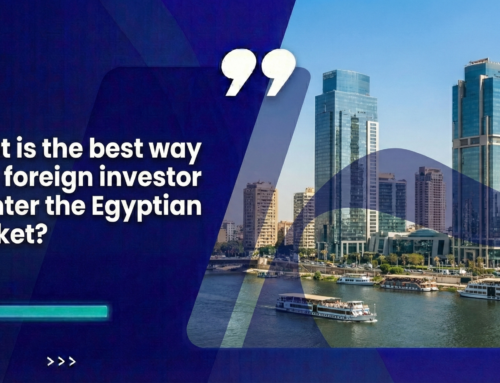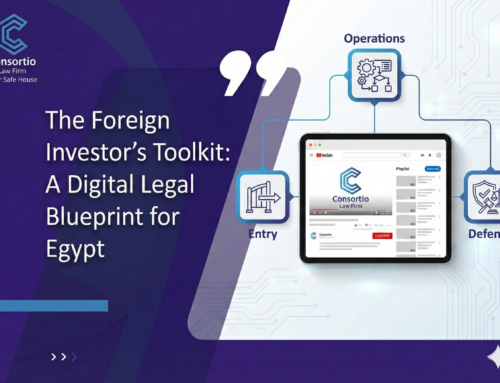The key to building a thriving business isn’t just about ideas, innovation or investment, it’s about understanding the rules that protect and empower you. At the heart of every successful deal, partnership or agreement lies one powerful force “the Law of Contract in Business Law” in Egypt. Whether you’re a startup founder, a seasoned entrepreneur or a foreign investor eyeing the Egyptian economy, knowing how contracts work isn’t just an advantage, it’s your secret weapon, giving you the confidence to negotiate smarter, protect your interests and grow your business with clarity and control.
Understanding the Law of Contract in Business Law in Egypt
A contract is an agreement between two or more parties whereby one or more parties undertake to perform an obligation or refrain from an act. The contract creates legally binding obligations.
In Egypt, the primary source governing contracts is the Egyptian Civil Code (Law No. 131 of 1948), specifically the sections relating to obligations and contracts. The Code provides detailed rules about the formation, execution and enforcement of contracts.
There are special provisions in Law of Contract in Business Law, including:
- Contracts can be in Arabic or bilingual (Arabic and English), but Arabic prevails in court.
- Commercial contracts may be subject to additional regulations such as the Egyptian Commercial Code and sector-specific laws.
- Certain contracts may require registration or notification to government authorities.
- Dispute resolution clauses often include arbitration under Cairo Regional Centre for International Commercial Arbitration (CRCICA).
And for a contract to be valid and enforceable under Egyptian law, it must include the following:
- Offer and Acceptance: One party makes an offer and the other accepts it without modifications.
- Capacity: Parties must have legal capacity (e.g., adults with sound mind).
- Consent: The agreement must be free from coercion, fraud, mistake or duress.
- Lawful Object: The purpose of the contract must be legal and not against public policy.
- Consideration: While Egyptian law doesn’t explicitly require “consideration” as in common law, the contract must have a legitimate cause (reason or cause) for the obligations.
Egyptian Contract Law aims to ensure freedom of contract, protect parties’ rights and promote certainty and fairness in business dealings. Knowing the rules helps businesses draft clear contracts, avoid disputes and enforce their rights effectively.
Types of Business Contracts in Egypt
There are many types of business contracts in Egypt related business practices, including:
-
Partnership Agreements
These agreements outline the terms for partnerships, including profit-sharing, capital contributions and management roles.
-
Joint Venture Agreements
These contracts involve collaboration on a project without forming a new company, common in real estate and infrastructure.
-
Lease Contracts
These agreements involve renting property or equipment for a specified period, specifying rent amount, duration and maintenance duties.
-
Agency and Distribution Contracts
An agent acts on behalf of a principal, while a distributor resells goods. Both are governed by the Commercial Code and may require registration with GAFI for foreign agents.
-
Employment Contracts
These contracts set terms between employers and employees, including job duties, salary, hours and termination conditions, regulated by Egypt’s Employment Law.
-
Franchise Agreements
Franchisees use the franchisor’s brand and model for a fee, with terms on exclusivity, support and royalties.
-
Construction Contracts
Used for construction projects, specifying work scope, timelines and penalties, often following FIDIC guidelines but complying with Egyptian law.
-
Loan and Financing Agreements
These agreements set the terms for borrowing, including repayment, interest and security, regulated by banking laws and the Central Bank of Egypt.
Differences Between Verbal and Written Contracts
Here’s a comparison table between verbal and written contracts:
| Aspect | Verbal Contracts | Written Contracts |
| Validity | Valid, except for certain contracts (e.g., real estate) | Always valid, preferred for clarity and enforceability |
| Proof & Enforcement | Harder to prove in court, risks of disputes | Easier to prove and enforce in court |
| Formality | Informal, based on trust and oral agreement | Formal, requires detailed terms and signatures |
| Risk of Misunderstanding | Higher risk of misinterpretation | Lower risk, terms are clearly defined |
| Types Requiring Writing | Suitable for simple agreements | Required for significant agreements (real estate, leases, etc.) |
| Flexibility | More flexible, easier to modify | Less flexible, requires amendments for changes |
The Function of Law of Contract in Business Law in Egypt
Understanding the function of the contract law in business law in Egypt is critical, ensuring that commercial activities run smoothly and fairly.
Here’s an overview of these main functions:
-
Facilitating Business Transactions
Contract law provides a clear framework for businesses to make enforceable agreements, ensuring smooth exchanges of goods and services.
-
Protecting Legal Rights
Contract law protects the legal rights of all parties, ensuring obligations are met and offering recourse if a party fails to perform.
-
Ensuring Certainty and Predictability
A well-drafted contract provides a clear roadmap for how business relationships will function, reducing ambiguity, helping businesses plan and build trust with partners.
-
Providing Mechanisms for Dispute Resolution
When conflicts arise, contract law offers mechanisms to resolve them, whether through Litigation in Egyptian courts or arbitration, based on agreed terms.
-
Promoting Fairness in Business Relations
Contract law ensures that businesses act fairly and are held accountable, preventing exploitation to foster an environment of mutual respect and trust in business dealings.
-
Regulating Commercial Activities
Egypt’s Commercial Code standardizes business contracts (e.g., agency, partnerships), ensuring they align aligns them with national legal norms.
How “Consortio Law Firm” Help?
Every successful business begins with a promise, written, signed, and legally binding. In Egypt’s growing economy, understanding the Law of Contract in Business Law in Egypt isn’t just smart, its essential, turning handshake promises into enforceable agreements, and business risks into protected ventures.
In these cases, having the right legal partner by your side makes all the difference. This isn’t just about legal protection, it’s about unlocking growth with clarity, control, and confidence.
“Consortio Law Firm” is a trusted legal partner for businesses operating in Egypt. With expertise in Law of Contract in Business Law, they provide tailored legal solutions to help you navigate the complexities of commercial transactions, contracts and regulations.
Here’s how we can directly assist you:
-
Contract Drafting and Review
We draft legally sound contracts for your business and review existing ones to ensure they’re enforceable and risk-free.
-
Contract Negotiation
Our legal team will help you negotiate the best terms with business partners, clients and suppliers, ensuring your interests are protected.
-
Dispute Resolution
If there’s a breach of contract or disagreement, our expert lawyers represent you in court or help resolve issues through arbitration or mediation.
-
Enforcing Contracts
When another party fails to meet their obligations, we help you enforce the contract, whether through legal action, claiming damages or seeking specific performance.
-
Compliance and Risk Management
We ensure your contracts comply with Egyptian law and help you avoid potential legal risks by advising on essential contract clauses.
-
Tailored Contract Advice
Whether it’s sales, leases, partnerships or distribution agreements, we provide expert legal advice tailored to your specific business needs.
-
International Business Transactions
We guide you through international trade and ensure your transactions comply with both local and global laws.
“Contract law provides the rules, but the courts provide the enforcement. For a realistic view of court timelines, see our Litigation & Dispute Resolution Guide.”
Whether you’re starting a business, entering into a partnership, or dealing with disputes, “Consortio Law Firm” is here, ensuring that your business interests are well-protected and compliant with Egyptian law.
Need help with your business contracts?
Let us in “Consortio Law Firm” handle your contract needs with precision and expertise to ensure compliance, and protect your business interests, so, you can focus on growing your business.
Contact us Now for a consultation via:
Phone number: (002-01028806061).
Email: (Info@consortiolawfirm.com).
FAQ’s
-
What is a contract?
A contract is a legally binding agreement between two or more parties that creates mutual obligations enforceable by law.
-
Is written form required for contracts in Egypt?
Not always; contracts can be oral or written, but certain contracts (like real estate sales) must be in writing.
-
What makes a contract enforceable?
It must contain all essential elements and must not be for an illegal or immoral purpose.
-
Can a contract be terminated under Egyptian law?
Yes, by mutual consent, fulfillment, breach or rescission under specific conditions.
-
Can foreigners enter into contracts in Egypt?
Yes, foreigners can enter into contracts, but some transactions may require special permits.
-
What contracts require notarization?
Contracts related to real estate, company formation and certain commercial agreements often require notarization.





